Diplomatic Bluebook 2023
Chapter 3
Japan's Foreign Policy to Promote National and Global Interests
2 Cultural, Sports, and Tourism Diplomacy
(1) Overview
For a very large number of foreign nationals who have an interest in Japan, Japanese culture is a motive for their interests. MOFA and JF carry out various projects ranging from introducing Japanese culture and sports to promoting inbound tourism, aimed at creating positive images of Japan abroad, boosting the overall Japanese brand and encouraging a deeper understanding of Japan, as well as fostering the circle of people with a great affinity toward or knowledge of Japan and increasing the number of foreign visitors to Japan in the post-COVID-19 world. For example, “Cultural Projects of Diplomatic Missions Overseas” introduce the wide-ranging attractions of Japan, from traditional culture such as tea ceremony, flower arrangement, and martial arts, to aspects of modern culture such as anime, manga and fashion, as well as Japanese food culture. As it continued to be difficult to implement programs with guests and participants in 2022 due to the COVID-19 pandemic, the diplomatic missions overseas also used online media to organize and conduct many programs.
Under the “Japan Brand Program,” MOFA has dispatched experts of various fields overseas to establish a national brand and give Japan a stronger presence in the world. MOFA also holds seminars, workshops, and demonstrations to share Japan's outstanding cultural assets, which represent a culmination of Japan's experience and wisdom. In light of the continued difficulty in sending experts overseas due to the spread of COVID-19, MOFA continued to share Japan's charm by incorporating projects using online platforms. Going forward, MOFA will continue to put effort into sharing Japan's diverse charm and strengths while harnessing tools such as online platforms and video-streaming,
In order to carry on the legacy of the Olympic and Paralympic Games Tokyo 2020 (“Tokyo 2020 Games”) held in 2021, MOFA engaged in initiatives as part of the “Sport for Tomorrow (SFT)” program, such as various sports exchanges and sports promotion support projects overseas, dispatching sports instructors through the JICA Japan Overseas Cooperation Volunteers (JOCV) program, and the provision of sporting equipment and improvement of sporting facilities through Cultural Grant Assistance. MOFA also provided information about these initiatives in Japan and abroad on MOFA's “MofaJapan × SPORTS” Twitter account.
MOFA conducts a range of activities through Japan's diplomatic missions overseas to promote a deeper understanding of Japan by fostering the circle of the next generation of people with a great affinity toward or knowledge of Japan and encouraging Japanese studies. These include providing information on studying in Japan; building alumni networks comprising foreign nationals who have studied in Japan; cooperating with the JET Programme, which invites young foreign nationals to work for local governments in Japan; holding exchange programs for youth and adults from Asia and the U.S.; and providing support for Japanese studies.
Promoting Japanese language overseas fosters individuals who engage in exchange with Japan, deepens understanding of Japan, and creates foundations for friendship between Japan and other countries. Japanese language education is becoming increasingly important, as evidenced by the promulgation and entering into force of the Act on Promotion of Japanese Language Education in June 2019, and the formulation of the Basic Policy for the Comprehensive and Effective Implementation of Measures to Promote Japanese Language Education (Cabinet Decision) in June 2020. Through JF, MOFA dispatches Japanese language specialists overseas, conducts training programs for overseas Japanese language teachers, and develops Japanese language education materials. To address the labor force shortage in Japan, Japan began accepting foreign workers under the “Specified Skilled Worker” residence status since April 2019. Through this connection, MOFA has also been working to meet a new type of need by providing Japanese language education to foreigners interested in coming to Japan for work.
In cooperation with the United Nations Educational, Scientific and Cultural Organization (UNESCO), Japan has been actively engaged in protecting the world's tangible and intangible cultural heritage as well as natural heritage. Moreover, Japan is actively taking part in the promotion of international frameworks for safeguarding heritage through conventions such as the World Heritage Convention and the Convention for the Safeguarding of the Intangible Cultural Heritage.
By putting creative efforts into promoting such cultural and sports diplomacy during the COVID-19 pandemic, such as through online channels, and by sharing information on Japan's charms to the world, MOFA also contributes to bringing more foreign visitors to Japan in the future.
(2) Cultural Programs
For Japan's foreign policy to be smoothly implemented in the international community, it is important to promote a better understanding of Japan among the individual foreign nationals who form the foundation of public opinion and policy making, and to make Japan's image even more positive. Based on this perception, MOFA engages in communicating information about the diverse attractions of Japan through diplomatic missions overseas and JF. Diplomatic missions overseas carry out a range of cultural projects as part of efforts to promote a deeper understanding of Japan and expand the circle of people with a great affinity toward Japan in the areas under their jurisdiction. For example, they actively introduce Japanese lifestyles and culture such as workshops on tea ceremony, flower arrangement and origami, Japanese film screenings, Japanese music performances, martial arts demonstrations, exhibitions on traditional crafts and Japanese photography, popular culture such as anime and manga, as well as Japan's food culture. At the same time, they also plan and implement Japanese speech contests and essay contests.
From January to February 2022, in cooperation with nine of Japan's diplomatic missions overseas located in the Spanish-speaking parts of Latin America and the Caribbean (Embassy of Japan in Argentina, Embassy of Japan in Peru, Embassy of Japan in Dominican Republic, Embassy of Japan in Colombia, Embassy of Japan in Ecuador, Embassy of Japan in Guatemala, Embassy of Japan in Paraguay, Consulate-General of Japan in Leon, and Consular Office of Japan in Santa Cruz), MOFA conducted calligraphy lectures and demonstrations as a cross-regional online cultural project. Calligraphers gave explanations about Japanese calligraphy tools and calligraphic styles, as well as reviewing works by participants. This provided an opportunity to deepen understanding about Japanese calligraphy while engaging in two-way communication online, and participants came from a total of 29 countries including Asia, Europe, and Africa.
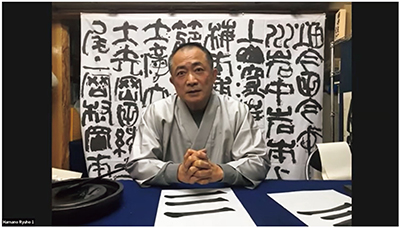 “Linking the Spanish-speaking Parts of Latin America and the Caribbean Through Calligraphy” (From January to February, Central and South America)
“Linking the Spanish-speaking Parts of Latin America and the Caribbean Through Calligraphy” (From January to February, Central and South America)With the aim of promoting timely understanding of Japan in years that mark diplomatic milestones, MOFA cooperates with government-affiliated organizations and private organizations to implement large-scale and comprehensive commemorative events intensively, and to engage in active exchanges. In 2022, large-scale cultural programs were held in the following countries to commemorate the respective anniversaries: China (September), Central Asia (Kyrgyz Republic (September), Tajikistan (October), Turkmenistan (November), Bangladesh (October), Mongolia (November), and United Arab Emirates (December).
In collaboration with MOFA and diplomatic missions overseas, JF promotes and provides support for Japanese-language education, Japanese studies, and Global Partnerships Programs for international dialogues, as well as runs arts and cultural exchange projects to promote Japanese culture and arts in a variety of forms throughout the world. Projects were implemented locally in all parts of the world despite various restrictions in place under the COVID-19 pandemic. In addition to holding Beyond Borders: Architectures of Japan, an exhibition on contemporary Japanese architecture in Shenzhen as one of the programs to commemorate the 50th anniversary of the normalization of Japan-China relations, Japanese traditional folk dance performance was implemented in Jerusalem and Tel Aviv to celebrate the 70th anniversary of the establishment of diplomatic relations between Japan and Israel.
 Japan Festival Support Program by JF (Deer Dance (Shishi-Odori) from Tohoku was performed at the Israel Festival) (September, Jerusalem, Israel; Photo courtesy of JF)
Japan Festival Support Program by JF (Deer Dance (Shishi-Odori) from Tohoku was performed at the Israel Festival) (September, Jerusalem, Israel; Photo courtesy of JF)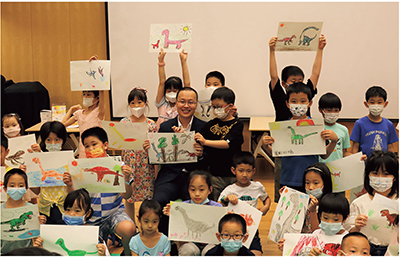 Japan-China exchange event on dinosaurs (July 30, Beijing, China)
Japan-China exchange event on dinosaurs (July 30, Beijing, China)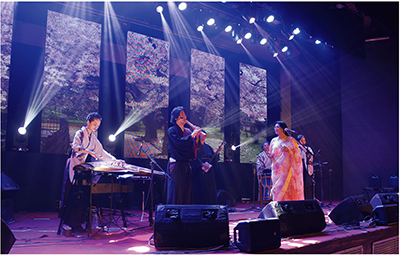 Japanese musical instrument concert to celebrate the 50th Anniversary of Friendship between Japan and Bangladesh (October 15, Dhaka, Bangladesh)
Japanese musical instrument concert to celebrate the 50th Anniversary of Friendship between Japan and Bangladesh (October 15, Dhaka, Bangladesh)At the Maison de la culture du Japon à Paris (The Japan Cultural Institute in Paris), which is JF's largest base for promoting culture in Europe, comprehensive efforts were made to promote Japanese culture. For example, all 50 works in film series Otoko wa Tsurai yo were screened over a one-year period, tourism pamphlets featuring various regions of Japan where each film was set (prepared by the Japan National Tourism Organization (JNTO)) were distributed at the screening venue. To ensure that the activities of the Institute contribute to the development of a sustainable society, the exhibition Un Bestiaire Japonais - Vivre avec les animeaux à Edo-Tokyo (XVIIIe-XIXesiècle) (“A Japanese Bestiary”) was held to focus on the Sustainable Development Goals (SDGs) in the Edo era, in addition to the distribution of the online program, “Shibusawa Eiichi and SDGs.”
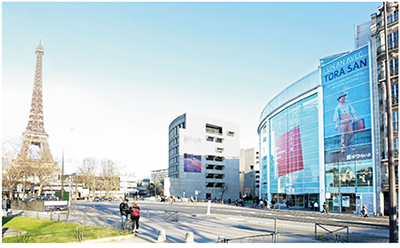 “Un an avec Tora san” held at the Maison de la culture du Japon à Paris (The Japan Cultural Institute in Paris) (Photo: JF, ©Maison de la culture du Japon à Paris/©Shochiku)
“Un an avec Tora san” held at the Maison de la culture du Japon à Paris (The Japan Cultural Institute in Paris) (Photo: JF, ©Maison de la culture du Japon à Paris/©Shochiku)In parallel with these efforts, JF also continued to actively roll out projects that leverage on the characteristics of the Internet medium, and expanded its multilingual video offerings such as “STAGE BEYOND BORDERS” and “Invitation to Explore Japan's Museums,” which introduce Japan's performing arts and unique museums across Japan to the world.
Under the “WA Project: Toward Interactive Asia through Fusion and Harmony” announced by Prime Minister Abe in December 2013 (see the Column on page 327), JF implements the NIHONGO Partners Program and two-way exchange programs in the field of arts and culture exchange. These are targeted at Asian countries, with a focus on ASEAN member states. In 2022, 223 persons were dispatched as NIHONGO Partners to nine countries and regions. JF also presents the “TIFF Lounge,” now in its third year, in cooperation with the Tokyo International Film Festival. Through this initiative, it provides opportunities for Japanese filmmakers active on the front lines and filmmakers in Asia as well as other countries and regions around the world, to engage in dialogues and exchanges in Tokyo.
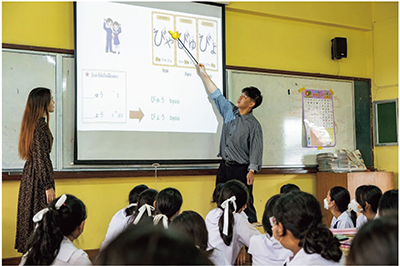 NIHONGO Partners providing support in classes (September, Prachin Buri, Thailand; Photo: JF)
NIHONGO Partners providing support in classes (September, Prachin Buri, Thailand; Photo: JF)The Japan International MANGA Award was launched by MOFA in 2007 with the aim of rewarding manga creators who have contributed to the spread of manga culture overseas and the promotion of international cultural exchanges through manga. The 16th Japan International MANGA Award, held in 2022, received a record-high 503 entries from 77 countries and regions, and the Gold Award was presented to a work from the Republic of Korea. This year, there were entries for the first time from Kosovo, Sri Lanka, and Mozambique.
(3) People-to-People Exchange and Exchanges in the Area of Education and Sports
To build personal relationships and promote a better understanding of Japan, MOFA carries out a number of programs that invite foreign nationals who have a significant influence on shaping public opinion and the policymaking process and who are expected to play a leading role in various fields. In the area of education and sports, MOFA conducts various activities to promote people-to-people exchanges. These programs not only promote mutual understanding and friendships but also enhance Japan's presence in the international community, which considerably benefits Japan's national diplomatic interests.
A Student Exchange Programs
MOFA actively introduces the attractiveness and opportunities of studying in Japan to foreign students through Japanese diplomatic missions overseas, and implements application and screening procedures to grant the Japanese Government (MEXT) Scholarship to promising students abroad. It also makes efforts to network with former foreign students who have returned to their home countries through Japan Alumni Associations and to foster the circle of people with a great affinity toward or knowledge of Japan. In March, the second Japan Alumni Conference was held online following the inaugural event held in the previous year, and it was attended by participants from 50 countries. At the Conference, alumni from various countries gave presentations on best practices and future challenges, and strengthened networks among alumni from different countries through the social gathering (see the Column on page 328).
In May, the Launch Event for the Quad Fellowship was held at the Prime Minister's Office of Japan with the attendance of the four leaders of Japan, Australia, India, and the U.S.. This Fellowship was announced at the 2nd Quad Summit (September 2021) as an educational and people-to-people exchange cooperation program, and awards scholarships for studying in the U.S. to outstanding individuals in STEM fields (science, technology, engineering, and mathematics) from the four countries. In December, the first 100 awardees (25 from each of the four countries) selected under the program were announced.
2022 marks the 70th anniversary of the Japan-U.S. Fulbright Program, a study abroad program between Japan and the U.S., and a commemorative ceremony was held in July. Under this Program, approximately 6,600 Japanese grantees have been sent to the U.S. and approximately 2,900 U.S. grantees have been accepted by Japan to date.
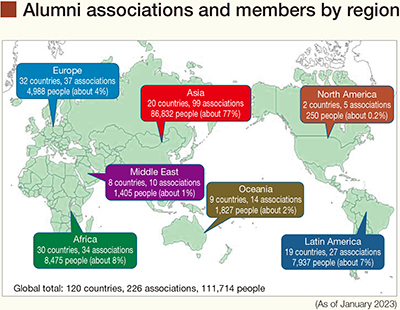
B JET Programme (The Japan Exchange and Teaching Programme)
The JET Programme was launched in 1987 to improve foreign language education in Japan and promote international exchange with Japanese citizens in local areas. This program is administered by local authorities and other organizations in cooperation with the Ministry of Internal Affairs and Communications (MIC), MOFA, the Ministry of Education, Culture, Sports, Science and Technology (MEXT), and the Council of Local Authorities for International Relations (CLAIR). Through the program, young foreign nationals are invited to Japan and appointed to posts in local governments and schools. MOFA is responsible for the application and screening process, pre-departure orientation, and support for the activities of the JET Alumni Association (JETAA), which operates in 18 countries and has about 25,000 members. With the relaxation of border measures in fiscal year (FY) 2022, 5,723 participants from 50 countries, including 2,038 new participants, were dispatched to all parts of Japan, and a total of about 75,000 people have participated in the JET programme to date as of December 31, 2022. JETAA conducts activities to introduce Japan in many countries. Many of those who went through the JET Programme are important human and diplomatic assets for Japan, as they go on to work in a variety of fields around the world as supporters for Japan and experts of Japan.
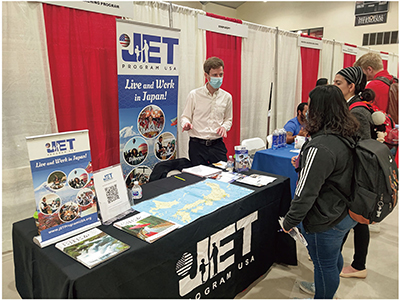 JET information session at a career fair at the University of St. Thomas (September, Houston, U.S.)
JET information session at a career fair at the University of St. Thomas (September, Houston, U.S.)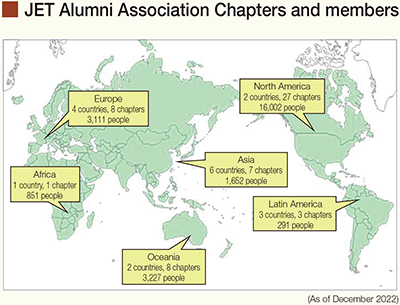
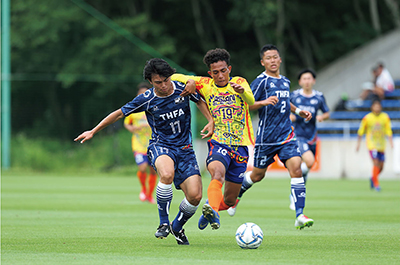 International friendly football match, “JapaFunCup” (June 2019, Fukushima Prefecture. ©JFA Photo: JF)
International friendly football match, “JapaFunCup” (June 2019, Fukushima Prefecture. ©JFA Photo: JF)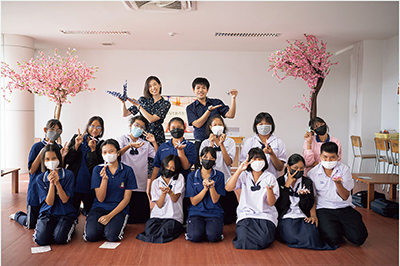 NIHONGO Partners introducing folded paper cranes (orizuru) at the assigned school (September, Thailand. Photo: JF)
NIHONGO Partners introducing folded paper cranes (orizuru) at the assigned school (September, Thailand. Photo: JF)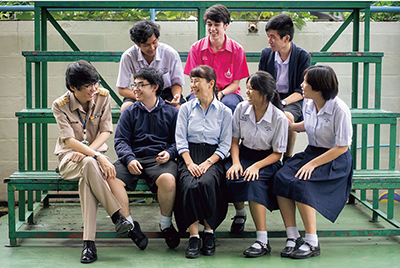 NIHONGO Partners chatting with students and teachers at their assigned school (September, Thailand. Photo: JF)
NIHONGO Partners chatting with students and teachers at their assigned school (September, Thailand. Photo: JF)Dating back to a decade ago, at the ASEAN-Japan Commemorative Summit Meeting held in Tokyo in December 2013 to mark the 40th Year of ASEAN-Japan Friendship and Cooperation, former Prime Minister Abe announced the launch of a new policy for cultural exchange in Asia, “WA Project: Toward Interactive Asia through Fusion and Harmony.” In response to this, the Japan Foundation (JF), as the implementing agency of this Project, intensively implemented new initiatives in the areas of “arts and cultural exchanges” and “support for Japanese language education.” Targeted at ASEAN and the rest of Asia and lasting until the year of the Olympic and Paralympic Games Tokyo 2020, these initiatives were based on the motto of harmony and fusion in diversity, and emphasized two-way interactions on an equal footing while respecting the identity of each country.
In the “arts and cultural exchanges,” projects that connect Asia and Japan were carried out in various fields including arts, film/moving images, music and dance, performing arts, sports, as well as intellectual and people-to-people exchanges. In the football project, for example, numerous exchanges took place through dispatch and invitational visits by coaches, referees and others. At the end of the project, a select team named “ASIAN ELEVEN” was formed, comprising players from each of the 10 ASEAN member states as well as Timor-Leste. Through opportunities such as a friendly match with the “U-18 Tohoku Selection Team” held at the J-Village in Fukushima Prefecture, this project contributed to raising the standard of “Asian football,” and enhanced mutual understanding and exchanges within the region through football. Against this backdrop, the developments and remarkable progress of ASEAN football is attracting global attention, such as the announcement of the bid by the 10 ASEAN member states to jointly host the FIFA World Cup in 2034.
To date, JF has dispatched about 2,600 “NIHONGO Partners” to various countries and regions in Asia, with a focus on ASEAN member states, to “support Japanese language education.” These “NIHONGO Partners” serve as assistants to local Japanese language teachers in junior and senior high schools and other learning institutes in each respective country and region. Through local Japanese language classes and activities that introduce Japanese culture, “NIHONGO Partners” also deepen their own knowledge of the local language, culture, and society. As human resources with knowledge of Asia, they contribute to promoting coexistence with other cultures and intercultural understanding all over Japan upon their return.
To date, the “WA Project” has facilitated exchanges of approximately 7.31 million people in Japan and Asia, and has contributed to expanding the circle of empathy among people. The leaders of ASEAN member states and others have expressed their desire for the continuation of the project. In October 2020, then-Prime Minister Suga visited Viet Nam and Indonesia as the first overseas trip after assuming office. In his speech delivered at the Vietnam-Japan University, he announced, “I am hoping to announce attractive cultural exchange projects to succeed the “WA Project” on the occasion of the 50th anniversary of Japan-ASEAN friendship and cooperation in 2023.” The year 2023, which marks the historical milestone of the 50th year of ASEAN-Japan Friendship and Cooperation, is an excellent opportunity for launching new initiatives toward strengthening exchanges between Japan and ASEAN in anticipation of the future, and it is hoped that the circle of empathy fostered through the “WA Project” will continue to be passed on to future generations.
A few years after returning to Mexico from Japan, where I earned a doctorate in arts and design, I went to a job fair for Japanese companies. With great surprise, I saw a large number of companies that I had not seen in Mexico before. I also noticed a significant increase in people interested in Japanese culture, especially among the youth, that extended from commercial products to the food market, language schools, film, theater, music, and the arts.
In 2018, as I was feeling the significant change of this new mindset towards Japan, a publication on social media announcing an event of the 130th Anniversary of Diplomatic Relations between Japan and Mexico, organized by the Mexican Association of Former Scholars of Japan (AMEJ), caught my eye. This was the start of my involvement in AMEJ.
Thanks to the initiative of the Japanese Government, who stresses the importance of having alumni associations, there are currently 226 Alumni Associations, spread over 120 countries, with more than 110,000 members worldwide, of which 556 are from Mexico. The scope of AMEJ's activities, through the headquarters in the capital Mexico City and its six regional branches, covers most of Mexico, a country more than five times the size of Japan. Among its members, there are scholars who studied in various special fields in addition to Japanese language and Japanese culture.
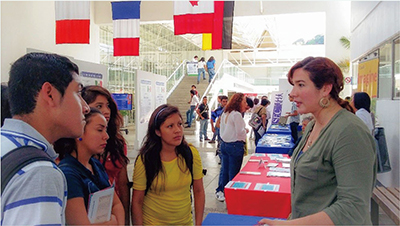 Promoting studying abroad in local cities
Promoting studying abroad in local citiesMarking the 28th year since its establishment, AMEJ is functioning as an alumni network that brings together highly skilled human resources who had the wonderful opportunity of studying in Japan. At the same time, it has also engaged in outreach activities such as collaborating with the Embassy of Japan in Mexico to publicize opportunities to study abroad and conduct pre-departure orientations, holding seminars and cultural events related to Japan, organizing networking events that bring together Japanese and Mexican companies, researchers, and alumni students, and providing support to Japanese students studying in Mexico. In addition to these, in light of the recent growing economic ties between the two countries, as shown by as many as 1,300 Japanese companies setting up bases in Mexico, AMEJ also cooperates with the Japanese Chamber of Commerce and Industry in Mexico on economic-related events, such as the recruitment event that I mentioned at the beginning of this article.
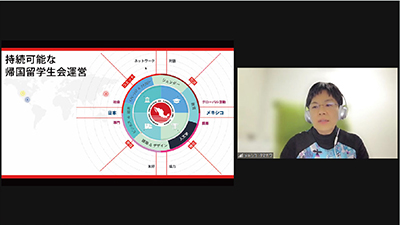 The author giving a presentation at the Second Japan Alumni Conference
The author giving a presentation at the Second Japan Alumni ConferenceIn 2022, AMEJ supported in-person activities of the Consulate-General of Japan in Leon, located in the Bajio region where many Japanese companies are based. We also strengthened ties with the Association of Japanese Scholars in Mexico (Nichi-Boku Koryukai), and we are in the process of connecting and creating alliances with alumni associations in Latin America and the Caribbean countries. Also, in view of the decline in the spread of COVID-19, we restarted the in-person activities and social gatherings in local Japanese restaurants to enjoy Japanese food and reminisce about our experiences in Japan, based on AMEJ's objective of strengthening the fraternity among its members. Moreover, at the Second Japan Alumni Conference held in March, in which alumni from 50 countries participated, AMEJ had the opportunity to present the topic on the challenges and opportunities of our activities and we were able to strengthen our lateral ties while deepening our friendships with alumni from other countries.
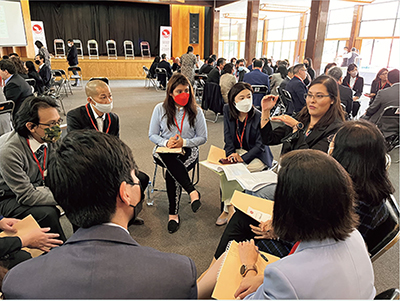 A networking event in Mexico City
A networking event in Mexico City Presenting Japan-related books in local cities
Presenting Japan-related books in local citiesBeing a volunteer organization, our challenge has not only been financial sustainability, but we are operationally limited by work commitments and time constraints. Management must sustain the interest and interaction ties, and it has been relevant to keep the members committed. It has also been of the utmost importance to allow the passion and commitment of future generations to grow, and we have needed strategies to encourage their collaboration. Placing an emphasis on these challenges, we will continue with our activities in the future.
Former international students of Japan are a treasure trove of a vast variety of professionals who can drive projects in the academic, economic, and humanitarian fields, and whose interests have been focused, committed, and emboldened by the experience of having studied in Japan. The source of energy for us former international students of Japan and Japan Alumni Associations is the knowledge we acquired and the friendships we made through the experience of studying in Japan. While I have mentioned various activities in Mexico as an example of one of the many Japan Alumni Associations around the world, at the root of these activities is our fervent desire to serve Japan's and our home country's society that influence us as human beings.
I would like the people of Japan to know that there are supporters of Japan among the former international students of Japan and the Japan Alumni Associations spread out across the world, and it is my hope that this wish can reach Japan from Mexico, as a neighbor across the Pacific Ocean. I wrote this column with the hope that we can cooperate together in any way we can for the benefit of Japan and the world.
C Sports Exchange
Sports enable communication beyond language and can be an effective tool for promoting friendly relations and a better understanding of Japan. To date, the Government of Japan has implemented the “Sport for Tomorrow (SFT)” program in the lead-up to the Olympic and Paralympic Games Tokyo 2020. Since FY 2022, a successor project to SFT has been ongoing to carry on the legacy of the Tokyo 2020 Games. Under the “Projects for Sports Diplomacy Enhancement” scheme, MOFA is engaged in sports exchange initiatives including providing support toward equipment transportation, thereby contributing to the development of bilateral relations. These projects enhance mutual understanding internationally and contribute to international peace by promoting diplomacy through sports and by nurturing people with a great affinity toward or knowledge of Japan. At the same time, they also improve the standing of Japan in the international arena.
D Japan's Friendship Ties Programs
With a view to expanding the basis for Japan's diplomacy, which develops bilateral and inter-regional relationships between Japan and countries and regions in the Asia-Pacific, North America, Europe, Latin America and the Caribbean, Japan's Friendship Ties Programs provide opportunities for multifaceted people-to-people exchanges to youths from various countries and regions, through invitations, dispatches, and online exchanges. In addition to promoting understanding of Japan, these projects also work to find and nurture people who will have great affinity toward or knowledge of Japan in the future. The Programs continued to be implemented online during the COVID-19 pandemic, but with the easing of Japan's border measures in 2022, in-person invitations and dispatches were finally resumed. Under the Japan's Friendship Ties Programs, online exchange and visit-Japan programs were newly launched to further deepen knowledge about Japan for Alumni who had previously visited Japan in person. These included attending lectures by Japanese experts in various fields such as politics, economics, society, culture, history, and diplomatic policies, observation tours in each field, and exchanges of opinions and cultural exchanges with the Japanese people. Program participants developed greater interest in Japan, built networks with the Japanese people, and expanded their horizons. Furthermore, the sharing of experiences by youths from various countries and regions, such as what they have learnt through the programs and the places they have visited, on social media and through reports presented to their respective organizations, also contributes to promoting understanding of Japan in the international society and to enhancing Japan's image.
(4) Exchange in the Intellectual Field
A Japanese Studies
JF comprehensively supports a range of overseas research activities related to the politics, economy, society, and culture of Japan. In 2022, JF's Japanese Studies Fellowship Program provided 210 researchers with the opportunity to visit Japan.
JF also dispensed research grants, and provided support for expanding the collection of books on Japan and for organizing seminars and symposiums, including online events, to a total of 45 institutions of Japanese studies in 25 countries and regions in 2022. In addition, it provided support to academic societies with the goal of promoting network building among Japanese studies researchers and research institutions from various countries and regions. As a part of the projects to celebrate the 50th anniversary of JF, a special panel session based on the main theme of “Strengthening Human Capital Pipelines for Area Studies” was held in March in conjunction with the annual conference of the Association for Asian Studies (AAS). Approximately 1,500 participants attended the session conducted in hybrid format combining in-person and online formats.
B International Dialogue
MOFA also implements a Global Partnerships Program for international dialogues through JF. Specifically, it supported and co-hosted seminars and symposiums based on the themes of common international issues, and conducts exchanges by dispatching or inviting authors and other guests. In addition, with a view to deepening interest in and understanding of Japan at the grassroots level in the U.S., it planned and supported exchange projects that contribute to promoting dialogue at various levels, human resource development, and the establishment of interpersonal networks. These include the implementation of the Japan Outreach Initiative (JOI) program, a Japan-U.S. grassroots exchange program that dispatches Japanese coordinators to the U.S.. At the Asahi World Forum 2022 (organized by The Asahi Shimbun Company) in October, JF implemented a special session entitled “Technology and Society: The Future and How We Shape It,” a dialogue between Professor ISHIGURO Hiroshi (Osaka University), a leader in the field of android research, and Professor Yuval Noah Harari (Hebrew University of Jerusalem), historian and global bestselling author of “Sapiens: A Brief History of Humankind” and other works.
C Japan-United States Conference on Cultural and Educational Interchange (CULCON)
CULCON is a panel where experts from the public and private sectors in Japan and the U.S. engage in discussions on culture, educational exchanges, and intellectual dialogues. In October, the U.S. CULCON panelists including the Chair Sheila Smith visited Japan, and a symposium based on the theme of mutual understanding between Japan and the U.S. was held at the Kyushu National Museum.
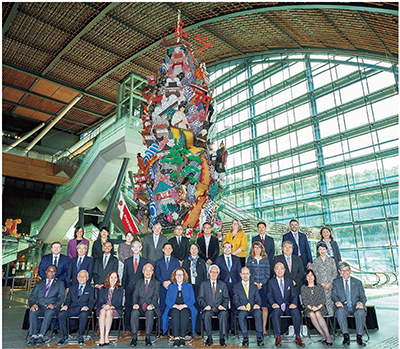 OH Sadaharu speaking at the Cultural and Educational Interchange (CULCON) Symposium 2022 (October, Kyushu National Museum. Photo: JF)
OH Sadaharu speaking at the Cultural and Educational Interchange (CULCON) Symposium 2022 (October, Kyushu National Museum. Photo: JF)D Cooperation with the United Nations University (UNU)
The UNU is the only UN organization based in Japan, and it contributes to the international community through study and research on global issues and human resource development. Japan has been providing various forms of cooperation and support to the organization. In addition to contributing to stimulating discussions on the SDGs with the launch of the BIG IDEAS: SDGs Dialogue Series in May by Senior Vice-Rector of United Nations University and Assistant Secretary-General of the United Nations SHIRAHASE Sawako, UNU also fulfills an important role in developing human resources who play an active role in the global arena, such as with the resumption of the in-person sessions of the UNU Conversation Series in September by then-Rector David Malone. In July, it was announced that Vice-Chancellor and Principal of the University of Johannesburg Tshilidzi Marwala would assume office as the next Rector of UNU with effect from March 2023. The UNU has also established Master's and Doctoral programs in its graduate school, and is making efforts to improve the quality of its global human resource development programs.
(5) Promotion of the Japanese Language
As the globalization of Japan's economy prompts more Japanese companies to do business overseas and Japanese pop culture finds increasing global popularity, interest in Japanese language is growing around the world, especially among young people. Further promotion of Japanese language overseas leads to a more favorable international environment for Japanese people and companies. A survey conducted by JF in FY 2021 found that approximately 3.79 million people in 141 countries and regions overseas learn Japanese. In 2019, the number of applicants for the Japanese Language Proficiency Test offered by JF (including those taking the test in Japan) reached a record high of about 1.37 million. The test has been conducted partially since 2020 due to the COVID-19 pandemic and the number of applicants has decreased. However, the number of applicants recovered to about 930,000 in 2022. Nevertheless, it is clear that a shortage of Japanese language teachers is a major challenge in the pursuit of satisfying the increasingly diverse interests in and needs concerning Japanese language learning in these many countries and regions.
Through JF, MOFA works to address the diverse needs related to Japanese language education overseas. For example, JF dispatches Japanese language specialists abroad, carries out training programs for Japanese language teachers, foreign-service officers and public officials, conducts Japanese language pre-training for nurse and care worker candidates under the Economic Partnership Agreement (EPA) with Indonesia and the Philippines, encourages educational institutions in each country and region to introduce Japanese language education and supports Japanese language educational activities, develops teaching materials, runs e-learning programs, and promotes the “JF Standard for Japanese-Language Education,” which corresponds with international standards for foreign language education.
To address labor force shortages brought about by declining birthrate and aging population in Japan, Japan has begun to accept foreign nationals under the new residence status as“Specifies Skilled Worker” since April 2019. Accordingly, through JF, MOFA is taking new measures, based on the “Comprehensive Measures for Acceptance and Coexistence of Foreign Nationals” (decided upon at the December 25, 2018, Ministerial Conference on Acceptance and Coexistence of Foreign Nationals), that include conducting the Japan Foundation Test for Basic Japanese (JFT-Basic), which assesses the Japanese language ability of foreign nationals who come to Japan (by the end of 2022, a total of about 81,000 people have taken the test in 10 countries overseas and within Japan), as well as developing and disseminating learning materials and curriculum with the goal of fostering people's Japanese language ability effectively, and nurturing local Japanese language teachers who teach Japanese to those who wish to work in Japan.
(6) Cultural Grant Assistance
To promote culture, sports, and higher education in developing countries, as well as provide support for the improvement of facilities and the purchase of equipment to be used in the conservation of cultural heritage, thereby enhancing mutual understanding and friendly relations between Japan and these countries, the Government of Japan provides Cultural Grant Assistance as part of the Official Development Assistance (ODA). The assistance implemented in 2022 consisted of five Cultural Grant Assistance projects (totaling around 503.5 million Japanese yen) and 23 Grant Assistance for Cultural Grassroots Projects (totaling around 197.4 million Japanese yen). In 2022, Cultural Grant Assistance was implemented with an emphasis on the provision of equipment for exhibiting, restoring, and preserving cultural assets in museums, while Grant Assistance for Cultural Grassroots Projects centered on cooperation in promoting sports, particularly Japanese martial arts (budo), and Japanese language studies.
(7) Cooperation through United Nations Educational, Scientific and Cultural Organization (UNESCO)
UNESCO is the first international organization that Japan became a member state of after the war, in 1951. Japan is actively involved in a variety of UNESCO projects in the fields of education, science and culture. Since 1952, Japan has continued to serve as a member of the Executive Board of UNESCO, and was reelected in the election of Executive Board members held in November 2021. Japan also cooperates with UNESCO to provide support to developing countries in areas such as education, science, and culture.
In the field of culture, Japan is providing cooperation with the preservation and promotion of the world's tangible and intangible cultural heritage as well as the provision of support in the field of human resource development as its major pillars. It also participates proactively in international frameworks for the protection of cultural heritage. Representative efforts in this area include the provision of support for the restoration and preservation of Angkor monuments in Cambodia since 1994, and the restoration and preservation of the Bamiyan ruins in Afghanistan since 2003. In these projects, Japanese experts played a central role, and human resource development was undertaken to enable local people to protect such sites by themselves in the future. At the same time, Japan has also provided support for the development of conservation and management plans for heritage sites, as well as for their preservation and restoration. In recent years, Japan has also been providing support for human resource development to African countries and small island developing states to help them strike a balance between protecting cultural heritage and sustainable development. As for the safeguarding of intangible cultural heritage, support is provided to projects to pass on traditional performing arts such as music, dance, and traditional arts and crafts to the next generation in developing countries, as well as projects involving development of domestic institutions and capacity building for relevant parties to enhance countries' ability to protect intangible cultural heritage by themselves.
In the field of education, on September 13, Japan deposited the instrument of acceptance of the Global Convention on the Recognition of Qualifications concerning Higher Education with the UNESCO Director-General. This Convention establishes the principles, criteria, and rights and obligations for recognizing or assessing higher-education qualifications, and provides for, among other things, the sharing of information on higher-education institutions. The conclusion of this Convention is expected to contribute to attracting international students to Japan and encouraging Japanese students to study abroad.
UNESCO Director-General Audrey Azoulay has been promoting “Strategic Transformation” toward strengthening UNESCO, which includes reforms for the de-politicization of UNESCO and organizational reforms, and Japan has been consistently supporting the Director-General in her work. Japan will continue to contribute actively to UNESCO's activities advanced under the leadership of Director-General Azoulay. In January 2023, Prime Minister Kishida received a courtesy call from Director-General Azoulay during his visit to France. Prime Minister Kishida stated that Japan places importance on the role that UNESCO plays in the fields of education, culture and science, and that it has been contributing proactively over the years. Prime Minister Kishida also stated that Japan would like to further strengthen the relationship between Japan and UNESCO. In response, Director-General Azoulay expressed her appreciation for Japan's financial support and stated that UNESCO would like to further strengthen cooperation with Japan, including support for Ukraine. Furthermore, both sides concurred to also cooperate in dealing with the World Heritage Committee.
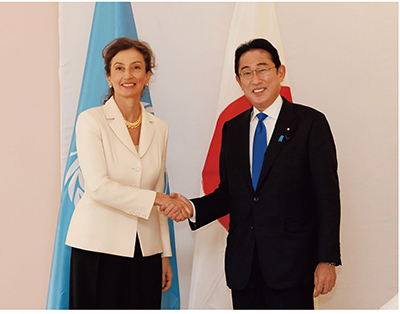 Prime Minister Kishida received a courtesy call from UNESCO Director-General Azoulay (January 9, 2023, Paris, France; Photo: Cabinet Public Affairs Office)
Prime Minister Kishida received a courtesy call from UNESCO Director-General Azoulay (January 9, 2023, Paris, France; Photo: Cabinet Public Affairs Office)A World Heritage Convention
The World Heritage Convention aims to protect cultural heritage and natural heritage internationally as heritage belonging to all mankind. Japan became a party to the Convention in 1992 (as of December 2022, the number of parties to the convention is 194). The sites listed on the “World Heritage List” are known as “World Heritage Sites.” They are classified into “Cultural Heritage Sites” (monuments and remains), “Natural Heritage Sites” (natural areas) and “Mixed Heritage Sites” (sites with both cultural and natural elements). As of December 2022, a total of 1,154 World Heritage Sites are inscribed on the World Heritage List, including 20 cultural heritage sites and five natural heritage sites in Japan. The 45th Session of the World Heritage Committee, which had been scheduled to take place in Kazan in June with Russia as the Chair, was postponed due to Russia's aggression against Ukraine.
With regard to the “Sites of Japan's Meiji Industrial Revolution” the State of Conservation Report was submitted in November to the UNESCO World Heritage Centre based on the decision adopted by the World Heritage Committee in 2021. Japan will continue to respond sincerely to the relevant decisions.
With regard to the “Sado Island Gold Mines” nominated for World Heritage inscription in February, the nomination dossier was submitted once again to the UNESCO World Heritage Centre in January 2023. Japan will continue to work toward the inscription of the site, while continuing to engage in in-depth discussions with the relevant countries.
B Convention for the Safeguarding of the Intangible Cultural Heritage
The Convention for the Safeguarding of the Intangible Cultural Heritage aims to develop an international system for safeguarding intangible cultural heritage such as traditional performing arts and traditional craftsmanship techniques (as of December 2022, the number of parties to the convention is 180). Japan, with abundant experience in safeguarding domestic intangible cultural properties, served as the chair of the intergovernmental working group reviewing the operational mechanism of this Convention, and led discussions by incorporating requests from developing countries. In November, it was decided that Japan's “Furyu-odori” would be inscribed on the Representative List of the Intangible Cultural Heritage of Humanity formulated based on this Convention. A nomination for the inscription of “Traditional knowledge and skills of sake-making with koji mold in Japan” in 2024 has been submitted to UNESCO.
C UNESCO Memory of the World Programme
The UNESCO Memory of the World Programme was established in 1992 to promote the safeguarding of and access to, and raise awareness of valuable archival heritage. As of December 2022, 429 items have been inscribed under the international register.
The fact that member states could not be involved in the assessment process of the nominations under the previous mechanism, even in the cases where there are clear discrepancies of views between the concerned member states, is not consistent with the founding principle of UNESCO: promoting friendly ties and mutual understanding among member states. After 2017, submission of new nominations was suspended, and Japan led the comprehensive review process of the programme. As a result, a new mechanism was approved by the UNESCO Executive Board in April 2021, under which nominations are submitted through the governments of member states. Additionally, a contestation system was newly established, which keeps nominations over which member states have conflicting views on hold until dialogues between the concerned countries have been concluded. With the completion of the review process, the call for new nominations resumed in July the same year. In November 2021, Japan submitted two nominations to UNESCO: “Three Comprehensive Printed Editions of the Buddhist Canon Held in Zojoji of the Jodo Shu”, nominated by Religious Corporation Jodo Shu and Jodo Shu Principal Temple Zojoji, and “the Monk Enchin Archives: A History of Japan-China Cultural Exchange”, nominated by Onjo-ji Temple and Tokyo National Museum.


